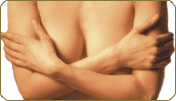Many women experience breast tenderness during the menopause transition. A woman's life can be significantly disrupted by breast tenderness. Therefore, it is important to understand what causes breast tenderness and how to treat it in order to deal with it adequately. Take your time to read the following article, which provides useful and important information about breast tenderness during menopause.
What Is Breast Tenderness?
Breast tenderness can be explained as pain, soreness, or any discomfort in the breasts. It is generally associated with swelling, soreness, aching, or pain that appears in either or both breasts.

Some degree of breast tenderness is not unusual during menopause. Breast tenderness is normal during menstruation, pregnancy, and breastfeeding. It is slightly noticeable and a little uncomfortable, but this symptom typically stabilizes after those periods end. However, most women will once again experience breast tenderness when approaching menopause.
What Causes Breast Tenderness during Menopause?
Breast tenderness can be caused by various factors, such as chest injury. However, in most cases, unbalanced levels estrogen and progesterone are the main cause behind menopausal breast tenderness.
During the menstrual cycle, estrogen and progesterone levels vary in different ways. Normally, when estrogen is up, hormonal imbalance can affect the breasts, making them bigger and more susceptible to pain. Therefore, when hormone levels are not balanced, breast tenderness or soreness can result.
Because the most common cause of breast tenderness during menopause is fluctuating hormone levels, maintaining balanced hormone levels can prevent or alleviate this symptom.
What to Do about Breast Tenderness during Menopause?
As hormonal imbalance is the most probable cause of breast tenderness during menopause, the first step is to ensure your body has the support it needs to produce sufficient hormones. The best way is to start with a healthy diet and increased physical activity, and the complement it with alternative therapies known to treat hormonal imbalance, such as phytoestrogenic and hormone-regulating supplements. For many people, healthy nutrition implies changes in lifestyle. It's always recommended to take up an exercise program, too. Making sure your bra is well-fitted and supportive can also go a long way in relieving tenderness, since old bras are usually stretched out and unable to support the breasts adequately.
There are several ways to manage breast tenderness during menopause, but a safe and efficient way is by combining lifestyle adjustments and alternative medicine, two approaches that complement each other well. Click on the following link to learn more about breast tenderness treatments to find what best fits you.
Sources
- BMJ Group. "Menopause: What is it?" Patient Leaflet. 2007.
- Hutchinson, Susan M.D. "The Stages of a Woman's Life: Menstruation, Pregnancy, Nursing, Perimenopause, Menopause". November 2007.
- Love, Susan M.D. Menopause and Hormone Book. New York: Three Rivers Press, 2003.
